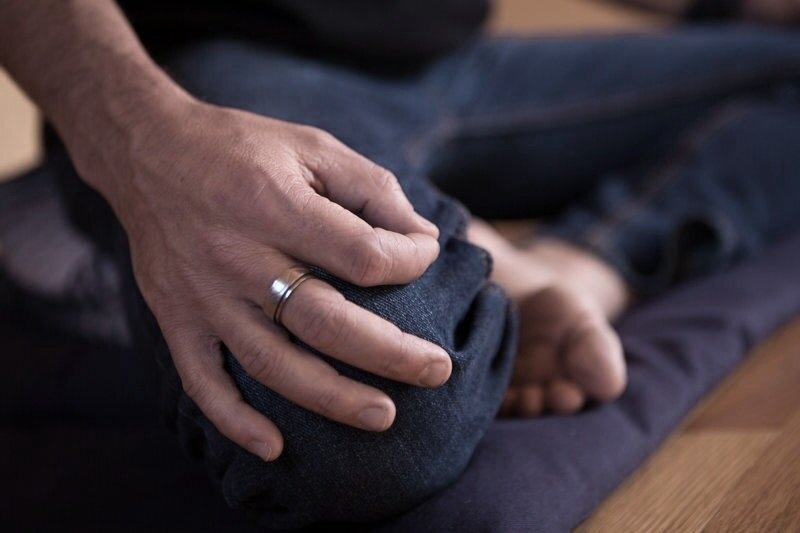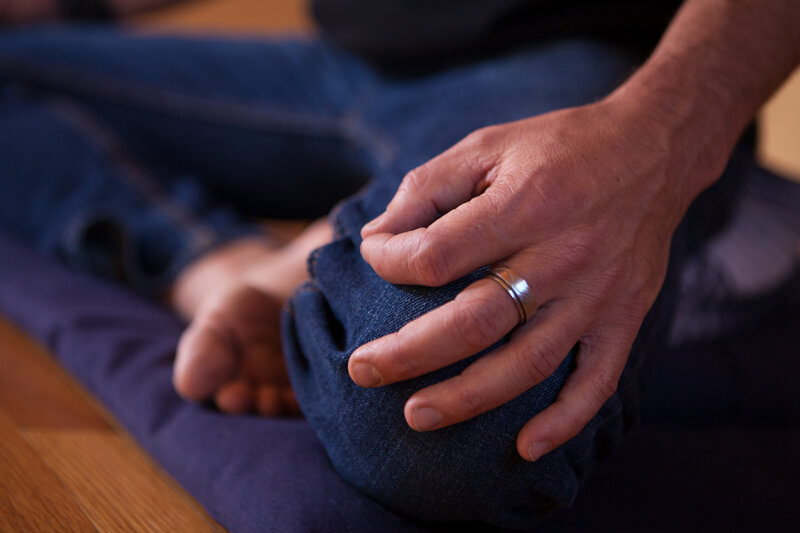
Simply Sitting
Create your lifelong meditation practice, this year
Meditation isn’t just about sitting still—it’s about sitting correctly. It starts with mastering the essentials: right posture, right mindset, right technique, and right intention. And it’s easier than you might think.
“You awaken by questioning everything, changing your mind, practicing meditation correctly, and opening your heart.”
— Junpo Roshi
Up to 70% of people who try meditation apps drop out within a few months.
The reason is simple: a routine hasn’t been built that delivers results, so getting through one’s resistance is impossible.
In Simply Sitting, we build a practice that supports the journey, not the destination. You will be taught how to align your body, calm your mind, and cultivate presence—skills that translate into every part of your life.
With the right start, sitting can become not just a practice but a part of who you are.
Most people are chasing something—seeking something—in their meditation: awakening, God, greater equanimity and peace, complete liberation.
This will never work, and will make your meditations as miserable as they are ineffective.
Here, we simple learn to sit and be with what is. Many benefits may arise from taking up a serious and disciplined meditation practice, but we work with the paradox of sitting with what is, now, not what may come tomorrow.
The goal is to simply sit, to allow whatever is here to be here, fully. And that includes enligthenment itself (but we don’t worry about that).
My teacher, Junpo Denis Kelly Roshi
“Enlightenment is intimacy with all things.”
— Dōgen Zenji
Testimonials
“Simply Sitting is more than a meditation course — it's a framework for a liberated life. Keith transmits wisdom with humor and story in a solidly-held container, encouraging students to be with everything that arises and bypass nothing in the process. I loved the balance of teaching and practice and depth.”
— Chris Muse
“This is an excellent introductory class on Zen that goes deep enough that experienced meditators can find value and learn from it. Keith Martin-Smith is a direct student of Junpo Denis Kelly Roshi, and joins him in wrestling with the form that Zen practice will take in the 21st century West.”
— Joseph Farley
“It's no BS practice. There's no "there" there. It's so rare to find a practice that integrates emotional work — and the answer to all questions isn't just "sit more". I also like that Keith is honest about his own challenges so there's a feeling of kinship and knowing that everyone, even the teacher, struggles at times.”
— Kevin Webb
“Nothing to do here, nothing to attain, just this moment and all it contains. ”
Just Sit
Our focus in Simply Sitting is on creating and sustaining a meditation practice that isn't about being spiritual.
It's also not about enlightenment. Or about attaining anything. It's not about anything you might experience. It’s not about mindfulness, or equanimity, or spiritual insight. It's about the simplicity of sitting, and being with what is, day after day. Spiritual things may happen, they may not—since this is not the goal of the practice, we don’t worry about silly things like enlightenment or liberation from your karma—those are just thoughts and ideas, after all.
Why sit, then? Because the reason we suffer is because we refuse to let reality be real. We refuse to accept the world as it is. RESIST, we’re told, as if resisting what is can lead to anything but suffering!
Does that mean we don’t fight to make the world a kinder, wiser, fairer place? Absolutely not. But we fight by first accepting what is. And we start this practice with ourselves.
What might it mean for you if you could sit with yourself, without judgement, for 30 minutes a day? What might that mean for our world?
Here, we’ll practice saying yes. Yes to the world as it is, in this moment, with all its imperfections. A yes to you as you are, in this moment, with all your imperfections, irritations, and sense of incompleteness.
What might saying yes make possible?
Calendar & Registration
8 weeks of guidance is all you’ll need to create, sustain, and most importantly enjoy a meditation practice—for the rest of your life.
• 8 classes, 1.5 hours each
• Guided meditations weekly
• Live Zoom calls
• Support between classes
• Group work & connection
8 Mondays
March 3-April 21
4:30-6pm PT, 7:30-9pm ET
3/3, 3/10, 3/17, 3/24,
3/31, 4/7, 4/14, 4/21
“Zen teaches nothing.
It merely enables us to wake up and become aware.
It does not teach, it points.”
CALENDAR: Mondays, March3-April 21 5:30-7 pm MT
Week 1: How to Sit—the Body
What is concentration practice?
The posture of Pure Awareness
Exploring 3 commitments in practice
We agree to sit in physical, mental, and emotional stillness
We agree to allow the stillness that is here to arise
We agree to come back to the first two commitments as often as necessary
Getting comfortable being uncomfortable
Guided Practice 1: How to Sit in the Posture of Pure Awareness
Week 2: How to Sit—the Mind
Here, now not “there, when….”
The art of not trying to be still, not trying to be quiet, not trying to be awake, and certainly not trying to be spiritual in our practice
Being with what is, without exception
Why we don’t try to overcome or destroy our egos
The paradox of practice (Or why a spiritual practice is pointless)
A simple view of Enlightenment, and its viewless view
Guided Practice 2: Concentration meditation using the breath
Week 3: Integrating Body and Mind
Deepening concentration practice through understanding our ego
Understanding what identity gives us, and what it costs us
What spiritual bypassing is
How to hold that bypassing inside a larger, wiser container of practice
Guided Practice 3: Learning to Bypass (without really bypassing)
Week 4: Standing on a Pier vs Swimming in Ocean
The Pier versus the Ocean
The problem of shared reality—no one can tell you what awakening is
Finding what is here and now—not in some far-away place or with a different kind of you
Why you can never awaken
How to fully release into this moment to see what’s really true
Guided Practice 4: Sitting as Awareness itself
Week 5: Developing the Capacity to be *with*
Relating to ego on the path — ego is a “process” not a “self”
How that self is fully conditioned
Guided Practice 5: tbd
Week 6: Developing the Capacity to be *with*, Part II
Why meditation can’t impact trauma
How to get the information in your feelings
The truth of anger
The truth of fear
The truth of trauma
Integrating emotions and meditation on and off the cushion
Guided Practice 6: tbd
Week 7: Emotional Integration
Why there are no victims in Zen
Facing your own heart
Facing what you bypass in your practice
Guided Practice 7: tbd
Week 8: Putting it All Together
Why there are no victims in Zen, Part 2
Understanding choice in your practice
Avoiding the traps of solipsism or narcissism
Living a victimless view without bypassing
Uncovering and acting from choice, compassion, and care
Guided Practice 8: tbd
3 Commitments
This is based in Zen. Therefore, you are required to commit to three things.
1. PRACTICE
Practice comes first: for the 60 days of the group, your practice comes first. This means that even in the midst of work, lovers, children, taking care of your sick body, being emotionally overwhelmed, your moon cycle, bankruptcy, a death in your family, or anything else, practice comes first.
You agree to practice 30-minute sits, 6 days a week.
No exceptions.
2. ATTEND WEEKLY CALLS
You attend calls to support each other AND yourself: the reason we practice together is because we’re stronger together. Showing up for your practice and for the weekly calls—especially when you’d rather not—means supporting your own practice and also the practice of the whole group.
You agree to miss no more than one of our group calls.
3. BE OPEN, HONEST, AND VULNERABLE
You commit to being open, honest, and vulnerable: we commit to being ruthlessly honest with ourselves and each other. In this group, we all agree to the importance of not stuffing what’s happening for us. We won’t make excuses or beat ourselves up. We choose not to sweep uncomfortable situations caused by individual or collective experiences under the rug, and we also choose to be skillful and patient in our communications.
You agree to be open, honest, and vulnerable.



